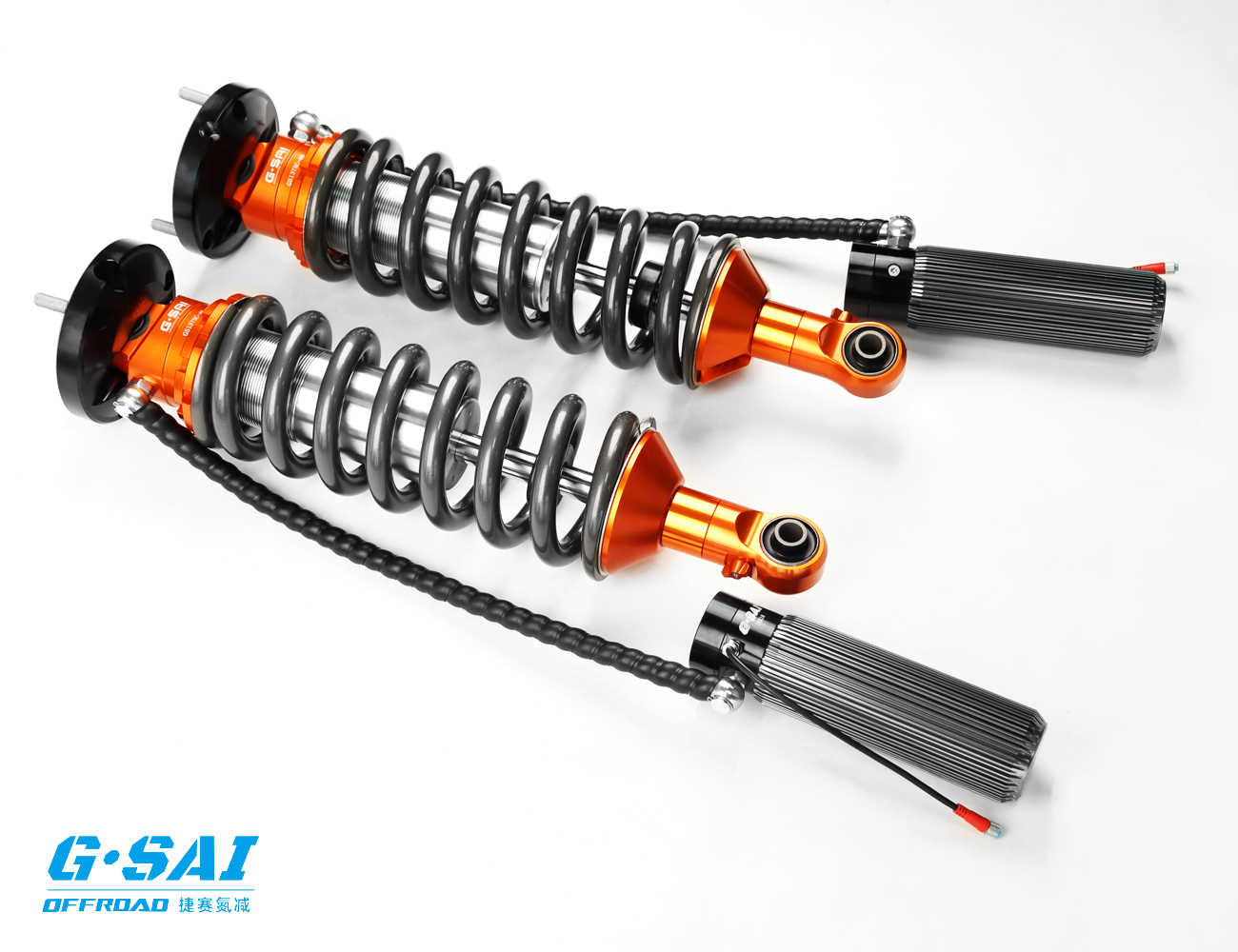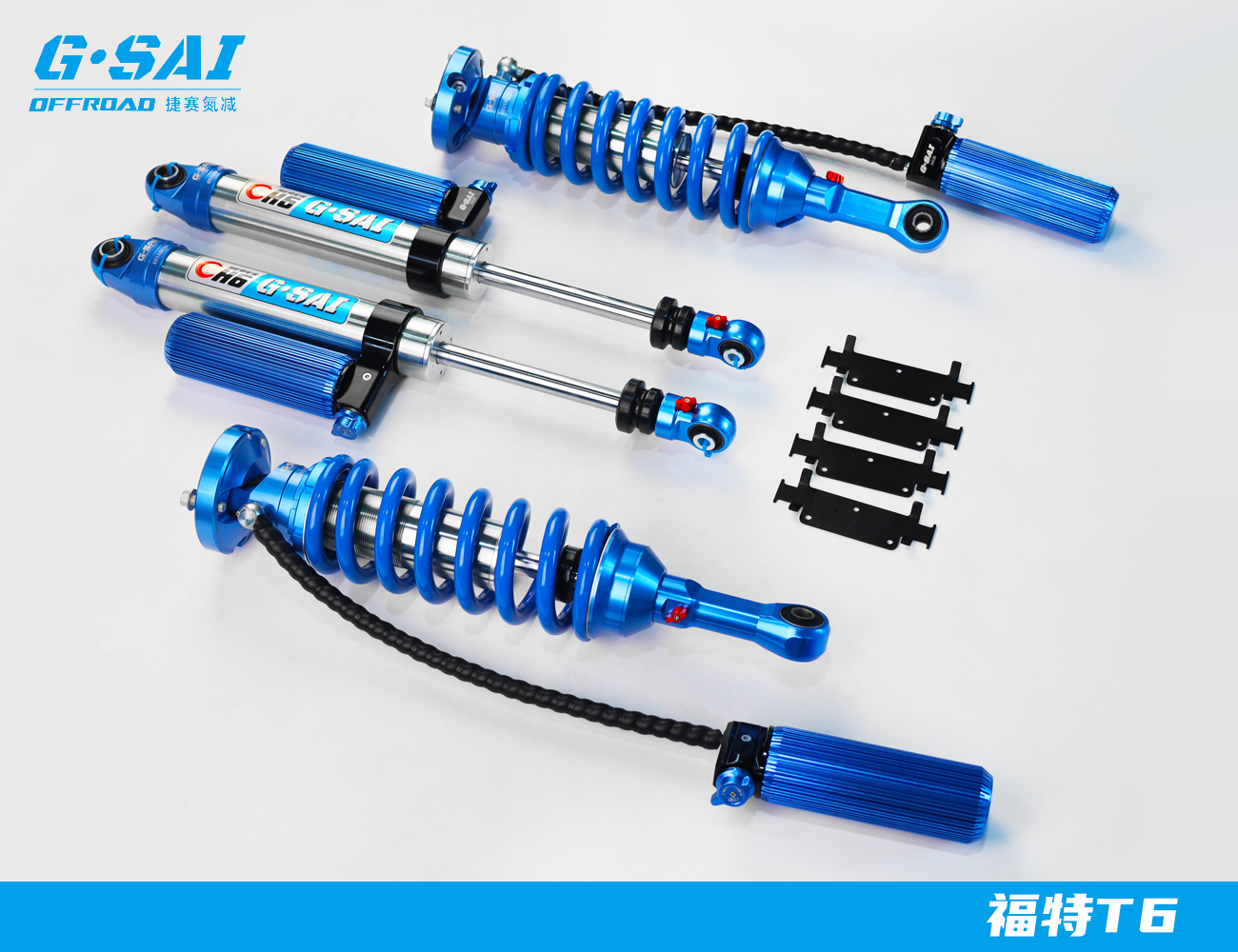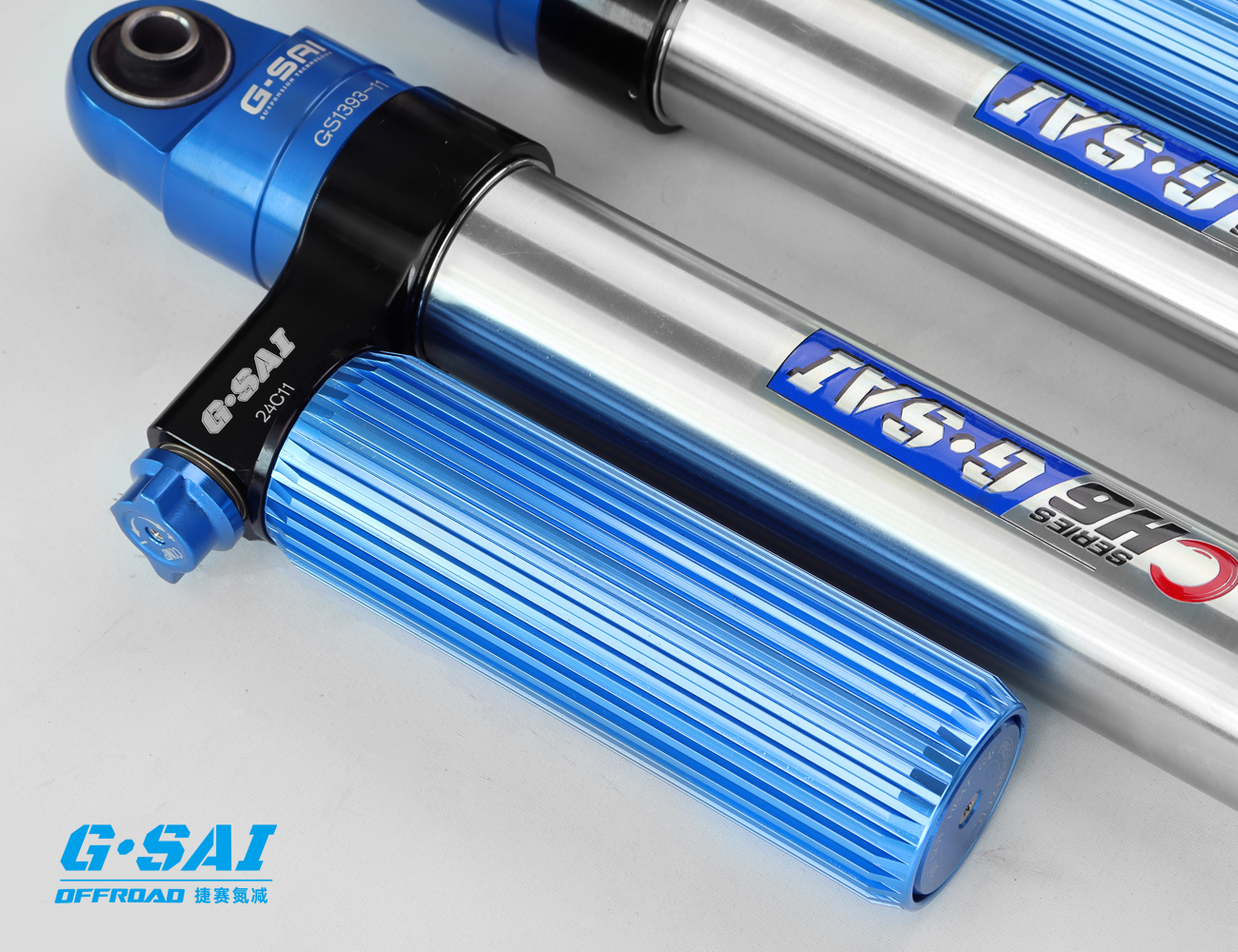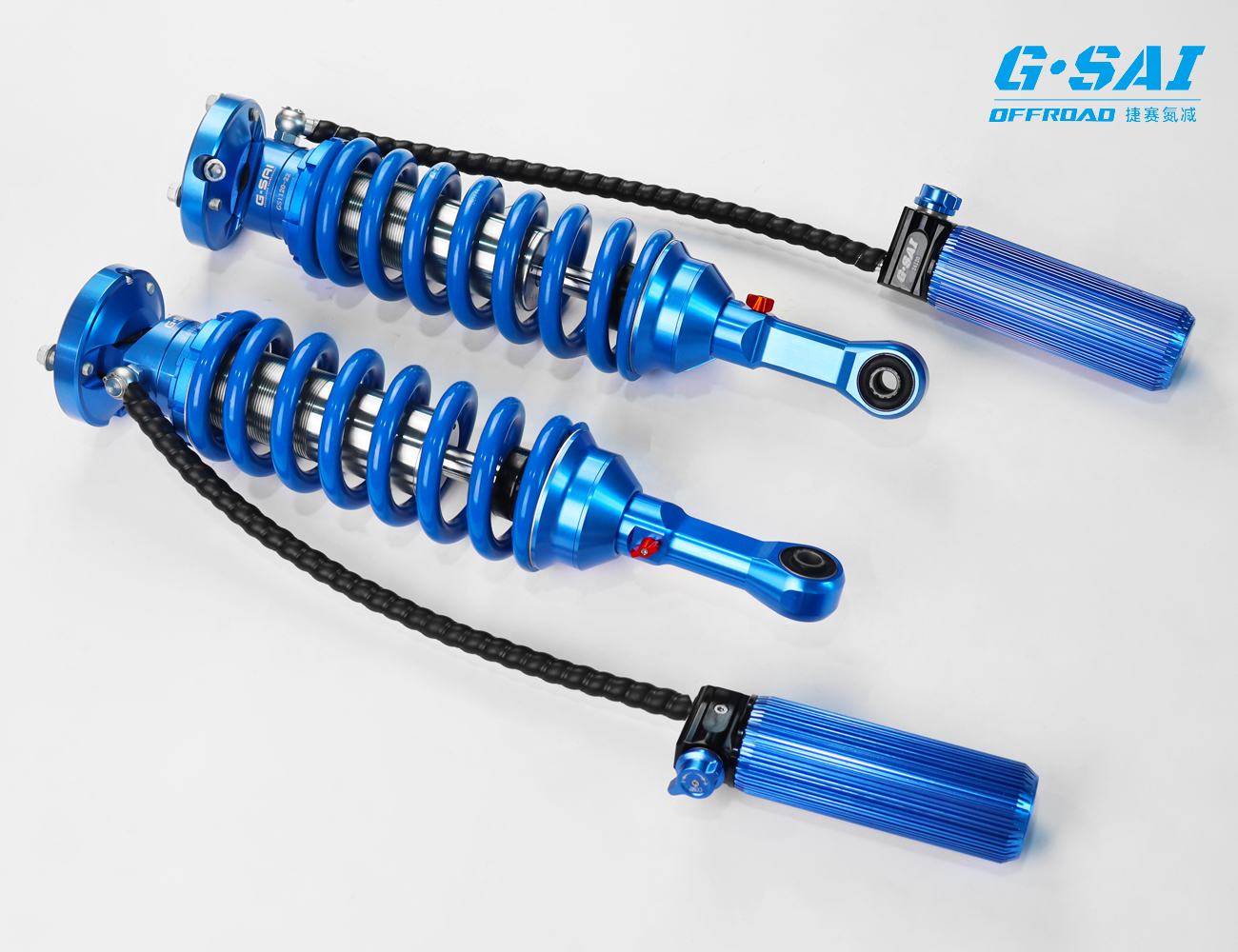Corrosion-Resistant Shock Absorbers: The Ultimate Guide for B2B Buyers
June 3, 2025
Share This Article
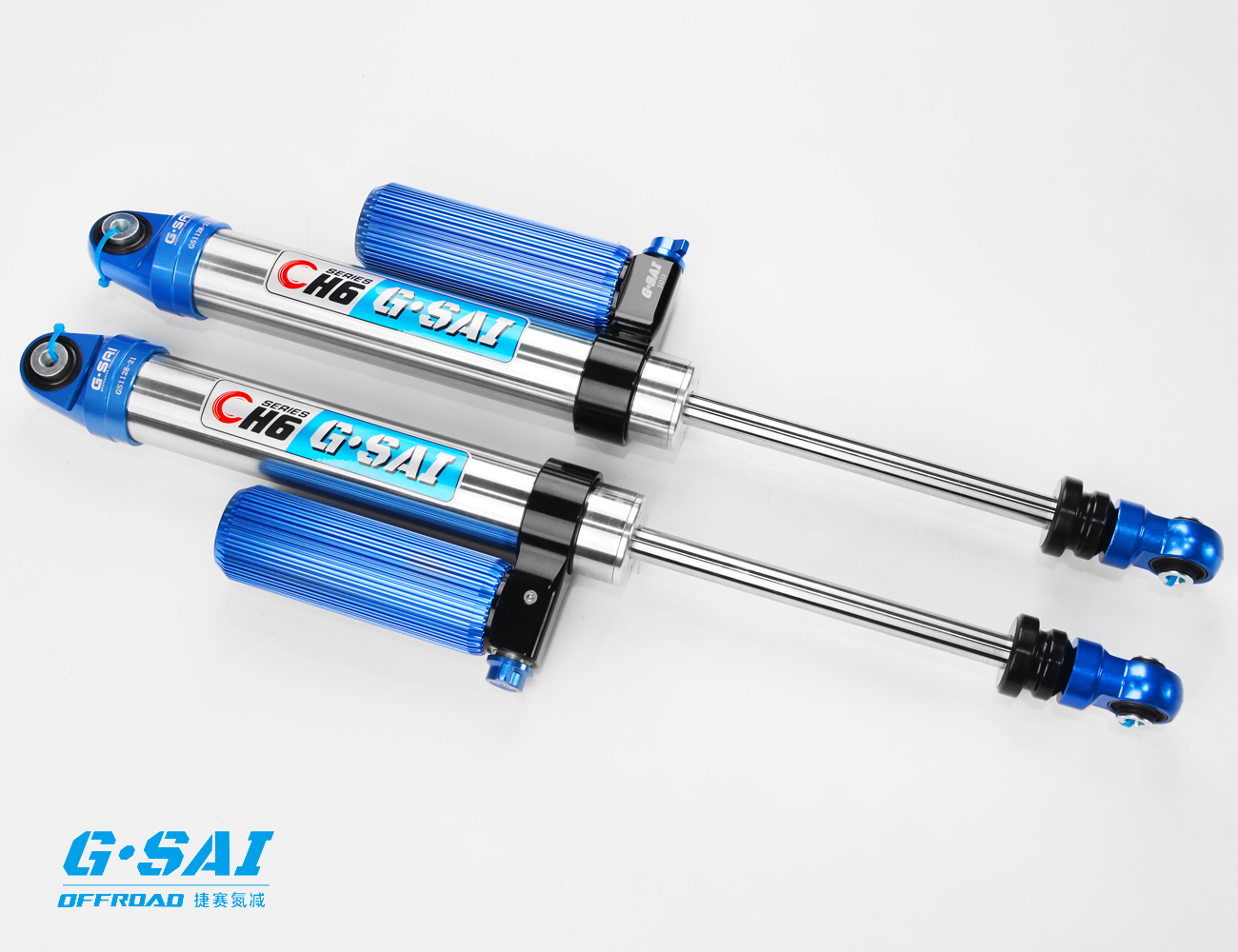
What Are Corrosion-Resistant Shock Absorbers?
Corrosion-resistant shock absorbers are specially engineered to withstand harsh environmental conditions, such as saltwater exposure, mud, snow, and chemically reactive road debris. These shock absorbers are treated or constructed with materials that prevent rust, degradation, and mechanical failure over time.
They are essential for:
- Off-road and rally racing vehicles
- RVs and camper vans exposed to coastal or snowy regions
- Utility and military vehicles operating in extreme conditions
- Fleet vehicles in high-humidity or industrial environments
Key Features of Corrosion-Resistant Shocks:
| Feature | Description |
|---|---|
| Anti-rust Coating | Zinc, nickel, or powder-coated finishes for long-term protection |
| Stainless Steel Components | For resistance against oxidation and wear |
| Anodized Aluminum Bodies | Lightweight and highly durable in corrosive settings |
| Sealed Design | Prevents moisture, dirt, and chemicals from entering the internals |
| High-Temperature Grease | Maintains performance in extreme heat and cold |
Common Materials Used:
- 304/316 Stainless Steel
- Anodized 6061-T6 Aluminum
- Hard Chromed Shafts with Protective Boots
- PTFE Seals and Bushings
Benefits to B2B Buyers and Distributors:
- Reduced warranty claims due to longer product life cycles
- Lower maintenance requirements for end-users
- Enhanced value proposition for modified and high-demand vehicle markets
- Ideal for private label and OEM customization
For suppliers and brands looking to upgrade their shock absorber offerings, corrosion-resistant options are a premium product category that attracts quality-focused buyers.
Applications of Corrosion-Resistant Shock Absorbers in Automotive Sectors
These specialized shock absorbers are not limited to one niche. They are widely used across several B2B automotive sectors, each with specific technical requirements and value drivers.
1. Off-Road Racing & Rally Sport
- Harsh Terrains: Sand, mud, water crossings, snow
- Demand: High-durability and consistent rebound/damping under stress
- Users: Racing teams, suspension tuners, motorsport parts wholesalers
2. Recreational Vehicles (RVs)
- Usage: Long-term travel in varying climates
- Demand: Comfort, corrosion resistance on coastal and mountain roads
- Buyers: RV brands, camper van upfitters, RV parts wholesalers
3. Military and Tactical Vehicles
- Environment: Salt flats, deserts, jungles, snowy bases
- Requirement: Zero-fail operation in life-critical applications
- Buyers: Government contractors, tactical vehicle OEMs
4. Heavy-Duty Utility and Mining Vehicles
- Exposure: Chemicals, salt, moisture, and rough terrain
- Need: Long service life, reduced downtime, and minimal maintenance
- Buyers: Industrial equipment suppliers, mining companies
5. Coastal and Snow Belt Fleet Vehicles
- Problem: Salt corrosion from roads and sea air
- Solution: Rust-proof shocks that maintain ride quality
- Buyers: Fleet maintenance companies, commercial vehicle dealers
Table: Industry Applications and Their Specific Needs
| Industry | Corrosion Threat | Key Requirements | Buyer Type |
|---|---|---|---|
| Off-Road Racing | Mud, sand, water | High performance, sealed design | Race teams, tuners |
| RV | Salt, climate changes | Comfort, durability | RV brands, upfitters |
| Military | Salt, jungle, snow | Fail-proof design | OEM contractors |
| Mining | Chemicals, terrain | Long life, easy maintenance | Equipment distributors |
| Fleet | Salted roads | Rust-free longevity | Fleet managers |
By integrating these types of corrosion-resistant dampers into your product line, you can serve a broader range of industrial and niche automotive clients.
Types of Corrosion-Resistant Shock Absorbers for Wholesale Buyers
Wholesale buyers and B2B distributors must understand the various types of corrosion-resistant shocks to meet the needs of their clients efficiently. Different builds serve different purposes—from basic anti-rust coatings to advanced custom builds for extreme environments.
1. Coated Steel Shock Absorbers
- Coating Types: Powder coating, e-coating, zinc plating
- Ideal For: Fleet vehicles, entry-level off-road applications
- Benefits: Affordable, decent resistance with proper care
2. Stainless Steel Shock Absorbers
- Material: 304 or 316 marine-grade stainless steel
- Ideal For: Marine environments, military, snow belt usage
- Benefits: High resistance to salt and chemicals
3. Anodized Aluminum Body Shocks
- Material: 6061-T6 aircraft-grade aluminum
- Ideal For: Racing, high-performance applications
- Benefits: Lightweight, heat-dissipating, corrosion-proof
4. Sealed Monotube and Twin-Tube Designs
- Structure: Completely sealed to prevent contaminant intrusion
- Ideal For: High-dust, high-moisture environments
- Benefits: Cleaner internals, less maintenance
5. Custom-Coated OEM Solutions
- Customizations Include: Branding, color coding, valving specs
- Ideal For: Private label brands, vehicle manufacturers
- Benefits: Full control over performance and aesthetics
Comparison Table: Shock Absorber Types
| Type | Corrosion Resistance | Weight | Cost | Ideal Buyer |
|---|---|---|---|---|
| Coated Steel | Medium | Medium | Low | Fleet operators |
| Stainless Steel | High | Heavy | High | Military, snow zones |
| Anodized Aluminum | High | Light | High | Racing teams |
| Sealed Designs | Very High | Varies | Medium | Off-road brands |
| Custom-Coated OEM | Variable | Variable | Variable | OEMs, private labels |
For B2B buyers looking to source top-tier corrosion-resistant shock absorbers, G·SAI offers a full range of customizable and high-performance options. As a leader in the shock absorber manufacturing industry, G·SAI supports OEM, bulk, and private label partnerships, ensuring you get both performance and reliability.
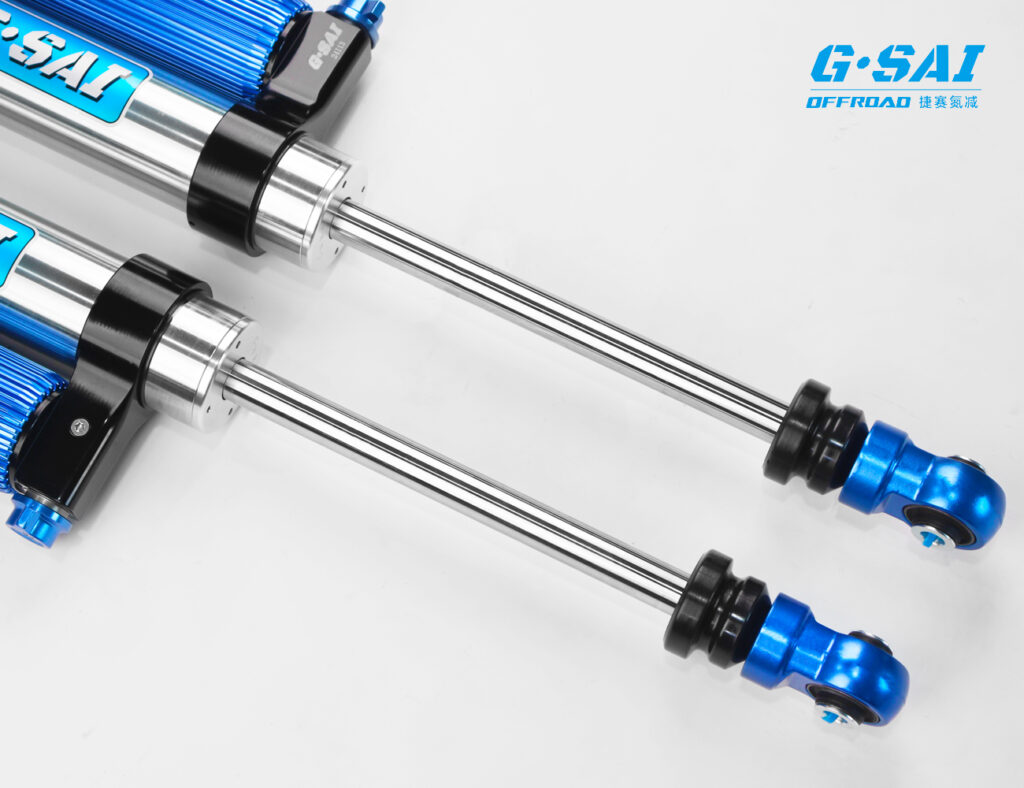
Corrosion-Resistant Shock Absorbers vs. Standard Alternatives
For B2B buyers, understanding the difference between corrosion-resistant shock absorbers and standard shock absorbers is crucial for making informed procurement decisions. Whether you’re an off-road accessories distributor or an OEM vehicle manufacturer, evaluating performance, cost, and lifecycle ROI helps reduce warranty claims and improve customer satisfaction.
Key Differences Between Corrosion-Resistant and Standard Shock Absorbers
| Feature | Corrosion-Resistant Shocks | Standard Shocks |
|---|---|---|
| Material Composition | Stainless steel, anodized aluminum, coated steel | Mild steel, uncoated or minimally protected |
| Environmental Resistance | High resistance to salt, chemicals, and moisture | Vulnerable to rust and corrosion |
| Durability | Long-lasting even in extreme conditions | Shorter lifespan in harsh environments |
| Maintenance Needs | Minimal, due to sealed and treated design | Frequent maintenance or early replacement |
| Target Use Cases | Off-road, military, marine, RV, snow belt | General consumer vehicles, mild climates |
| Investment Value | Higher upfront cost, lower long-term cost | Lower upfront cost, higher lifecycle cost |
Performance Comparison Table
| Performance Metric | Corrosion-Resistant | Standard |
|---|---|---|
| Lifespan (in harsh conditions) | 5–7 years | 1–2 years |
| Failure rate (12-month avg.) | <2% | 10–15% |
| ROI for Fleet Operators | High | Low |
| Ideal for Private Label? | ✅ | ❌ |
Why B2B Buyers Should Prioritize Corrosion Resistance
- Lower Total Cost of Ownership (TCO): Even though corrosion-resistant shocks cost more initially, they reduce replacement costs and labor over time.
- Enhanced Brand Reputation: If you’re reselling or branding your own line, offering premium corrosion-resistant products positions your brand as high-quality.
- Compliance and Safety: Some government and fleet contracts require corrosion-resistant components for safety reasons.
- Better Compatibility with Harsh Environments: From snowplows to overlanders, these shocks are a must-have.
Choosing the right shock absorber is not just about ride comfort—it’s about long-term operational efficiency and brand value. For example, G·SAI’s corrosion-resistant shock absorbers come with anodized aluminum bodies and hermetically sealed internals, ensuring optimal performance even in salt-heavy or chemically reactive terrains. This makes them the preferred choice among off-road racing teams and RV OEMs.
How to Assemble and Maintain Corrosion-Resistant Shock Absorbers
A key advantage of investing in corrosion-resistant shocks for your supply chain is reduced maintenance—but that doesn’t mean they are maintenance-free. Understanding the proper installation and upkeep procedures ensures your clients get the maximum product lifespan and performance.
Step-by-Step Assembly Instructions (B2B Installation Guide)
Tools Required:
- Torque wrench
- Spring compressor (for coilovers)
- Anti-seize lubricant
- Vehicle-specific mounting kits
Assembly Steps:
- Preparation:
- Clean all mounting points and remove rust or debris.
- Apply a thin layer of anti-seize compound to mounting bolts.
- Shock Installation:
- Align the shock absorber with the upper and lower mounts.
- Torque bolts to manufacturer specifications (usually 70–90 ft-lbs).
- For coilovers, compress the spring and secure the top hat.
- Post-Installation Check:
- Inspect for clearance issues.
- Ensure seals and boots are intact.
- Perform a test drive and retorque after 100 miles.
Maintenance Tips for B2B Clients
| Maintenance Task | Frequency | Notes |
|---|---|---|
| Visual Inspection | Every 10,000 km | Check for leaks, corrosion, boot integrity |
| Cleaning | Monthly in harsh environments | Use mild detergent and rinse with water |
| Bolt Retorquing | After initial 100 km, then every 20,000 km | Prevents loosening due to vibration |
| Suspension Rebalancing | Annually | Especially for racing or off-road applications |
Common Maintenance Mistakes to Avoid
- Using high-pressure washers directly on seals
- Skipping anti-seize on mounting bolts
- Ignoring early signs of seal failure or shaft wear
G·SAI shock absorbers are engineered with PTFE-coated bushings and multi-layer seals, reducing the risk of premature failure. This means lower maintenance costs for your clients, making them ideal for private label or OEM distribution. You can explore their full technical specs and options on the product page.
Choosing the Right Corrosion-Resistant Shock Absorber for Off-Road and Racing Applications
When it comes to off-road and racing environments, standard shocks simply won’t cut it. B2B buyers need to match the right corrosion-resistant shock to the correct use case. That includes selecting the right build materials, damping characteristics, and mounting configurations.
Key Buying Criteria for Off-Road Use
- Material Composition:
- Go for anodized aluminum or marine-grade stainless steel
- Avoid untreated steel or plastic components
- Damping Adjustability:
- Choose shocks with adjustable compression and rebound
- Look for external reservoirs for thermal stability
- Mounting Style:
- Eyelet-to-eyelet or pin-to-eyelet depending on vehicle
- Consider custom brackets for modified builds
- Travel Length:
- Longer travel = better articulation on uneven terrain
- Ideal for lifted vehicles or rock crawlers
- Seal Technology:
- Multi-lip seals with dust wipers
- Resistant to mud, sand, and water
Recommended Specs for Off-Road Racing
| Feature | Recommended Spec |
|---|---|
| Body Material | 6061-T6 anodized aluminum |
| Shaft Material | Chrome-plated hardened steel |
| Damping | 16-way adjustable rebound/compression |
| Reservoir | Remote or piggyback |
| Mounting | Custom eyelet or pin mounts |
| Seal Type | Triple-lip with wiper |
Recommended Specs for Snow & Salt Environments
| Feature | Recommended Spec |
|---|---|
| Coating | Zinc or nickel plating |
| Internal Lubricant | Cold-resistant synthetic oil |
| Boot Material | Neoprene or thermoplastic rubber |
| Shaft Protection | Full-length boot with clamp |
| Mounting Hardware | Stainless steel |
G·SAI’s Competitive Advantage
G·SAI not only meets but exceeds these rigorous specifications with products engineered by Cai Xianyun, a veteran with 17 years of experience in custom shock absorber R&D. Their products are trusted in competitive racing, snow belt operations, and RV overland applications, thanks to:
- Advanced CNC-machined parts
- Custom valving per vehicle model
- One-on-one technical consulting
- Integrated dealer support network worldwide
Whether you’re sourcing for a racing team or developing a private label for off-road enthusiasts, G·SAI provides best-in-class shock absorber solutions that deliver performance and durability in the harshest environments.
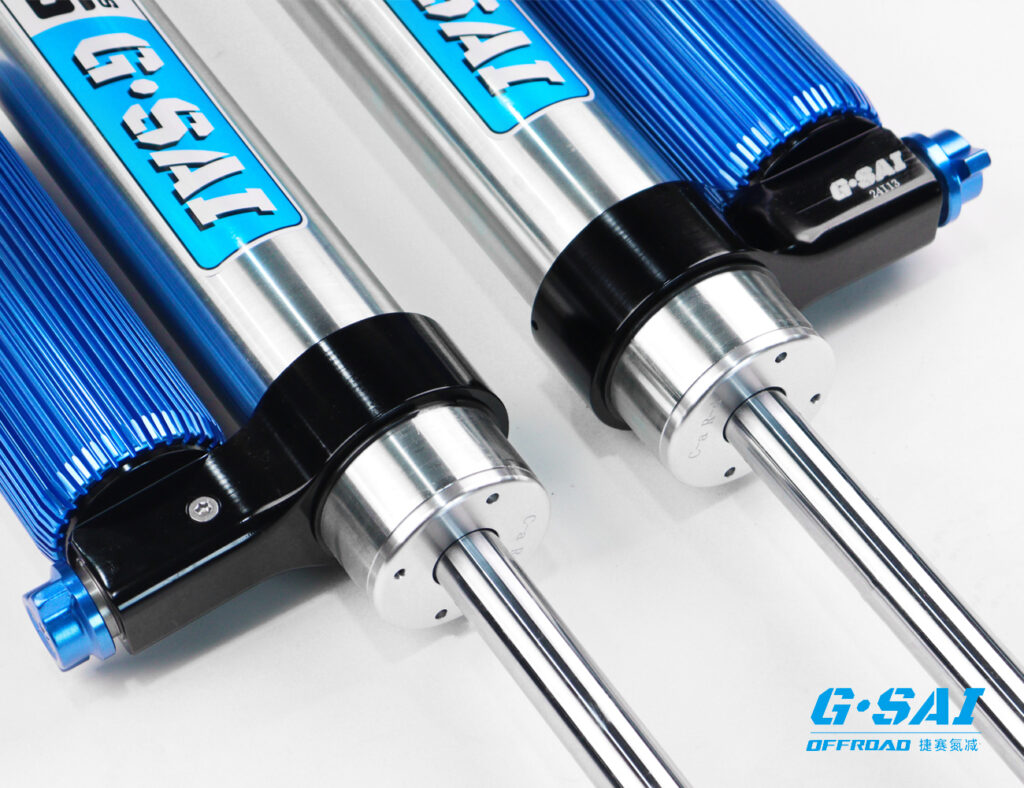
Custom Corrosion-Resistant Shock Absorber Solutions for OEMs and Auto Brands
For automotive brands, OEM manufacturers, and private label companies, the ability to customize corrosion-resistant shock absorbers provides a critical competitive edge. Whether it’s for off-road kits, RV upgrades, or tactical vehicle platforms, custom solutions offer tailored performance, branding flexibility, and enhanced value proposition.
Why Custom Shock Absorbers Matter in B2B
B2B buyers need more than just a “one-size-fits-all” product. Customization allows:
- Performance tuning for specific vehicle weights and terrains
- Brand differentiation through exclusive designs and packaging
- Compliance with regional regulations or certifications
- Optimized fitment for non-standard suspensions or vehicle lifts
Customization Options for Corrosion-Resistant Shocks
| Custom Feature | Description | Benefits |
|---|---|---|
| Material Selection | Choose from stainless steel, anodized aluminum, or coated steel | Tailor for environment and weight |
| Damping Valving | Rebound and compression tuning | Precision handling and comfort |
| Mounting Configuration | Eyelet, pin, clevis, or custom brackets | Seamless integration with any chassis |
| Branding | Private label logo, custom color anodizing | Market differentiation |
| Packaging | Custom retail or OEM packaging | Enhanced brand visibility |
B2B Use Cases for Custom Shock Absorbers
- Off-Road Equipment Brands: Sell pre-tuned shock kits for lifted trucks and 4x4s
- RV Manufacturers: Offer corrosion-resistant suspension upgrades as factory options
- Fleet Vehicle Builders: Equip vehicles with heavy-duty, low-maintenance shocks
- Military & Tactical OEMs: Ensure durability in extreme conditions with bespoke builds
- Aftermarket Distributors: Launch branded shock absorber lines with exclusive specs
G·SAI: Industry Leader in Custom Shock Absorbers
As China’s top-tier manufacturer of corrosion-resistant and high-performance shock absorbers, G·SAI offers one-on-one OEM consultation and R&D services for brands looking to launch custom suspension solutions.
Key capabilities include:
- In-house R&D lab for road simulation and performance testing
- 17+ years of engineering experience from Chief Engineer Cai Xianyun
- Large-scale CNC machining and assembly workshops for fast, scalable production
- Dedicated private label support and international logistics
If you’re launching a new auto brand or expanding your aftermarket product line, visit G·SAI’s Contact Page to discuss your custom shock absorber needs.
Top 5 Corrosion-Resistant Shock Absorber Manufacturers for B2B in 2025
When sourcing corrosion-resistant shock absorbers for wholesale or OEM use, your choice of manufacturer directly impacts product reliability, brand perception, and profit margins. Below are the top 5 global manufacturers to consider in 2025, based on performance, customization capabilities, and B2B service infrastructure.
1. G·SAI (China) – Best for Custom R&D and Off-Road Applications
- Specialization: Off-road, RV, and racing shock absorbers with corrosion-resistant specs
- Strength: Custom engineering, fast prototyping, in-house CNC and simulation lab
- Why B2B Buyers Choose G·SAI:
- OEM/ODM capabilities
- Excellent after-sales technical support
- Proven performance in competitive motorsport and overlanding
🔗 Learn more about their product range on the official product page
2. Bilstein (Germany) – Premium Brand with Global Reach
- Specialization: High-performance shocks, including marine and off-road variants
- Strengths: Global distribution, OE certifications
- Limitations: Limited customization options, premium pricing
- Best For: Luxury auto brands, performance tuners
3. Fox Factory (USA) – Racing and Off-Road Expertise
- Specialization: Remote reservoir and coilover shocks for extreme off-road use
- Strengths: Motorsport heritage, large aftermarket presence
- Limitations: High MOQ for B2B clients
- Best For: Racing teams, specialty off-road brands
4. Monroe (USA) – Mass OEM Production
- Specialization: General automotive suspension for mainstream vehicles
- Strengths: High-volume production, global factories
- Limitations: Not focused on extreme corrosion resistance
- Best For: Fleet vehicle suspension programs
5. Old Man Emu by ARB (Australia) – Off-Road & 4×4 Upgrades
- Specialization: Heavy-duty shocks for SUVs and overland vehicles
- Strengths: Built for rugged terrain, good corrosion resistance
- Limitations: Regional focus, limited OEM engagement
- Best For: 4×4 accessory brands
Manufacturer Comparison Table
| Manufacturer | Customization | MOQ | Corrosion Resistance | Ideal For |
|---|---|---|---|---|
| G·SAI | ✅ Full OEM/ODM | Flexible | ✅✅✅ | Off-road, RV, OEMs |
| Bilstein | ❌ Limited | High | ✅✅ | Luxury, OE suppliers |
| Fox | ✅ Moderate | High | ✅✅✅ | Racing, off-road kits |
| Monroe | ❌ None | Very High | ✅ | Fleet OEMs |
| Old Man Emu | ✅ Low | Moderate | ✅✅ | 4×4 aftermarket |
For buyers seeking a flexible, high-performance partner in Asia, G·SAI remains the go-to choice for corrosion-resistant shock absorber manufacturing. With scalable production and white-label capability, they provide unmatched value for global B2B distributors and OEMs.
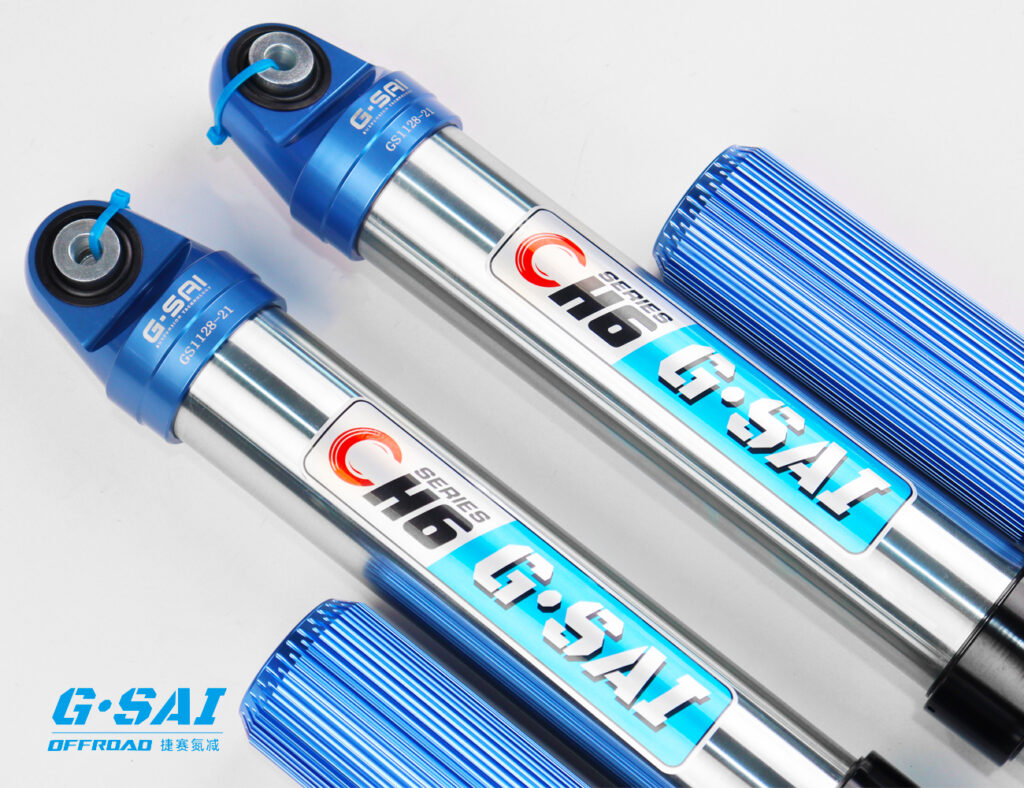
FAQ: Everything You Need to Know About Corrosion-Resistant Shock Absorbers
Q1: What makes a shock absorber corrosion-resistant?
A corrosion-resistant shock absorber uses special materials or coatings such as stainless steel, anodized aluminum, or powder-coated steel to prevent rust and degradation from salt, chemicals, and moisture.
Q2: Are these shocks suitable for snow and salt belt regions?
Absolutely. Corrosion-resistant shocks are specifically engineered for environments with heavy road salt use, snow, and salt-laden air, ensuring long-term durability.
Q3: Can I private label corrosion-resistant shocks?
Yes. Manufacturers like G·SAI offer full private labeling, including custom branding, packaging, and performance tuning. This is ideal for aftermarket brands and vehicle upfitters.
Q4: What is the typical lifespan of corrosion-resistant shock absorbers?
In harsh environments, they can last 3–5 times longer than standard shocks—typically 5–7 years with proper maintenance.
Q5: How can I get a quote for bulk or OEM orders?
You can contact G·SAI directly for B2B inquiries, custom engineering consultations, and product catalogs.
Q6: Are these shock absorbers adjustable?
Many corrosion-resistant models come with adjustable rebound and compression settings, especially those used in racing or off-road applications.
Q7: Is there a minimum order quantity (MOQ) for wholesale purchases?
MOQs vary by manufacturer. G·SAI offers flexible MOQs, especially for long-term partners and private label clients.
📌 For a complete overview of G·SAI’s dealer support, product options, and customization capabilities, visit their Dealer Network Page.
🚀 Whether you’re an OEM, a tuning brand, or a racing team, sourcing corrosion-resistant shock absorbers is a smart investment in performance, longevity, and customer satisfaction. Partner with G·SAI to future-proof your product line and build a brand trusted by professionals worldwide.

